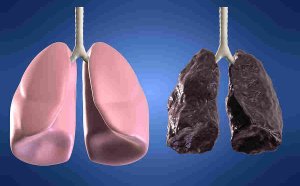
Lung cancer caused by smoking cigarettes
A risk factor is anything that affects your chance of getting a disease such as cancer. Different cancers have different risk factors. Some risk factors, like smoking, can be changed. Others, like a person’s age or family history, can’t be changed.
But having a risk factor, or even several, does not mean that you will get the disease. And some people who get the disease may have few or no known risk factors.
Several risk factors can make you more likely to develop lung cancer. (These factors are related to the risk of lung cancer in general, so it’s possible that some of these might not apply to small cell lung cancer.)
Exposure to asbestos
People who work with asbestos (such as in some mines, mills, textile plants, places that use insulation, and shipyards) are several times more likely to die of lung cancer. Lung cancer risk is much greater in workers exposed to asbestos who also smoke. It’s not clear how much low-level or short-term exposure to asbestos might raise lung cancer risk.
People exposed to large amounts of asbestos also have a greater risk of developing mesothelioma, a type of cancer that starts in the pleura (the lining surrounding the lungs). For more on this type of cancer, see Malignant Mesothelioma.
In recent years, government regulations have greatly reduced the use of asbestos in commercial and industrial products. It’s still present in many homes and other older buildings, but it’s not usually considered harmful as long as it’s not released into the air by deterioration, demolition, or renovation. For more information, see Asbestos and Cancer Risk.
Other cancer-causing substances in the workplace
Other carcinogens (cancer-causing substances) found in some workplaces that can increase lung cancer risk include:
- Radioactive ores such as uranium
- Inhaled chemicals such as arsenic, beryllium, cadmium, silica, vinyl chloride, nickel compounds, chromium compounds, coal products, mustard gas, and chloromethyl ethers
The government and industry have taken steps in recent years to help protect workers from many of these exposures. But the dangers are still there, so if you work around these products, be careful to limit your exposure whenever possible.
Air pollution
In cities, air pollution (especially near heavily trafficked roads) appears to raise the risk of lung cancer slightly. This risk is far less than the risk caused by smoking, but some researchers estimate that worldwide about 5% of all deaths from lung cancer may be due to outdoor air pollution.
Arsenic in drinking water
Studies of people in parts of Southeast Asia and South America with high levels of arsenic in their drinking water have found a higher risk of lung cancer. In most of these studies, the levels of arsenic in the water were many times higher than those typically seen in the United States, even in areas where arsenic levels are above normal. For most Americans who are on public water systems, drinking water is not a major source of arsenic.
Radiation therapy to the lungs
People who have had radiation therapy to the chest for other cancers are at higher risk for lung cancer, particularly if they smoke. Examples include people who have been treated for Hodgkin disease or women who get chest radiation after a mastectomy for breast cancer. Women who receive radiation therapy to the breast after a lumpectomy do not appear to have a higher than expected risk of lung cancer.
VIDEO REVIEWS



Share this Post
Related posts
Research paper on smoking cigarettes
Since 1994, multiple legal and scientific developments have altered the tobacco control environment and thus have affected…
Read MoreLung cancer due to smoking
U.S. Department of Health and Human Services. . Atlanta, GA: U.S. Department of Health and Human Services, Centers for Disease…
Read More
 Nicotiana ( /ˌnɪkɵʃiˈeɪnə/) is a genus of herbs and shrubs of the nightshade family (Solanaceae) indigenous to North and South America, Australia, south west Africa and the South Pacific. Various Nicotiana species, commonly referred to as tobacco plants, are...
Nicotiana ( /ˌnɪkɵʃiˈeɪnə/) is a genus of herbs and shrubs of the nightshade family (Solanaceae) indigenous to North and South America, Australia, south west Africa and the South Pacific. Various Nicotiana species, commonly referred to as tobacco plants, are...
 Nicotiana tabacum, or cultivated tobacco, is a perennial herbaceous plant. It is found only in cultivation, where it is the most commonly grown of all plants in the Nicotiana genus, and its leaves are commercially grown in many countries to be processed into...
Nicotiana tabacum, or cultivated tobacco, is a perennial herbaceous plant. It is found only in cultivation, where it is the most commonly grown of all plants in the Nicotiana genus, and its leaves are commercially grown in many countries to be processed into...










